Early Childhood and School Age
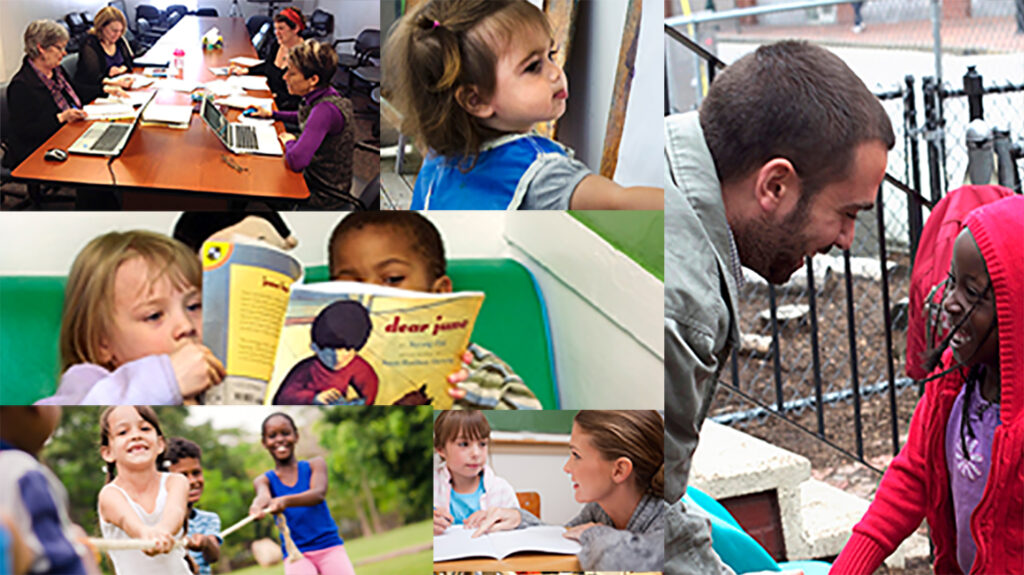 The University of Maine Center for Community Inclusion and Disability Studies (CCIDS) is Maine’s congressionally authorized University Center for Excellence in Developmental Disabilities (UCEDD). Established in 1992, CCIDS brings together the resources of the university and Maine communities to enhance the quality of life for individuals with intellectual and developmental disabilities and their families. Our statewide mission is met through interdisciplinary education; research and evaluation; community engagement, outreach education and technical assistance; and dissemination of state-of-the-art information that reflect the guiding principles of inclusion, diversity, universal design and access, and social justice.
The University of Maine Center for Community Inclusion and Disability Studies (CCIDS) is Maine’s congressionally authorized University Center for Excellence in Developmental Disabilities (UCEDD). Established in 1992, CCIDS brings together the resources of the university and Maine communities to enhance the quality of life for individuals with intellectual and developmental disabilities and their families. Our statewide mission is met through interdisciplinary education; research and evaluation; community engagement, outreach education and technical assistance; and dissemination of state-of-the-art information that reflect the guiding principles of inclusion, diversity, universal design and access, and social justice.
CCIDS early childhood and school age staff work statewide with individuals with disabilities, families and existing systems, organizations and networks by collaborating with and supporting enhancements to existing services (including networks that serve people in rural communities and other unserved and underserved populations, such as culturally and linguistically diverse populations) to ensure access, participation and support in child care, schools and communities by:
- Providing information, resources, training and technical assistance in the areas of equity, diversity, inclusion (DEI).
- Providing training and consultation to schools on inclusive practice, social emotional learning and mental health.
- Providing training and consultation to families on inclusive practice with students with disabilities.
- Participating in a collaborative study of rate of expulsion and suspension from Maine public preschool programs.
- Facilitating technology based and in-person Communities of Practice (CoPs) and Professional Learning Communities (PLCs) to support TA professionals to implement TA approaches (mentoring, coaching, consultation and Peer-to-peer networks).
- Providing culturally competent workshops on autism spectrum, IEP process, advocacy, and other critical topics.
- Analyzing policies related to education of children with developmental disabilities.
- Conducting research to maintain and improve quality of early care and education practice in an Early Head Start/Head Start demonstration site and use nationwide and local Educare sites outcome data for research in early care and education targeting a wide population of children at risk for later school failure at addressing the needs of children with disabilities.
CCIDS is also a partner in the Maine Roads to Quality Professional Development Network (MRTQ PDN), a coordinated early childhood professional development system that supports professionals to provide inclusive high quality early childhood programs. Our work includes:
- Ensuring that the current trainings include specific pedagogy for children with disabilities woven throughout the entire curricula.
- Developing and teaching supplemental courses that support early childhood professionals’ confidence and competence to care for and teach children with diverse learning styles, backgrounds and needs.
- Creating and field-testing and supporting professionals in the attainment of specialty competency-based credentials.
- Supporting professionals who wish to focus on their training, course work, and professional experience in the field through the attainment of the:
- Maine Inclusion Credential, designed to help professionals build skills, knowledge, resources, and attitudes to promote quality, inclusive practices in their programs.
- Maine Technical Assistance Credential designed for TA professionals who act as a mentor, coach, consultant and/or Peer-to-Peer Network facilitator who are able to document the specific knowledge, training, experience and professionalism in specific subject matter, adult learning and Technical Assistance pedagogy.
- Providing technical assistance including consultation and peer-to-peer network facilitation with specialists, including technical assistance, inclusion and early childhood mental health consultants.
- Coordinating and staffing the Warm Line service for telephonic and email access to professionals for advice, problem-solving and help locating resources.
- Providing consultation and training in creating accessible materials.
Featured Resources
Below are some featured resources on a variety of topics for people with intellectual and developmental disabilities, their families, and the professionals and communities that support them. Some of the resources require a PDF viewer. You can download Acrobat Reader here.
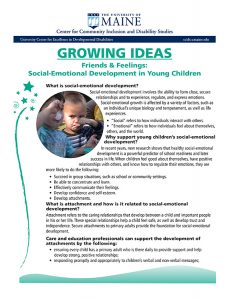 Growing Ideas Tipsheets and Resources for Guiding Early Childhood Practices – Free tipsheets and resources on a variety of topics related to quality inclusive care and education for young children. Each tipsheet is designed to be a starting point, providing basic topical information and pointing the reader to some of the best sources of extended information on the topic. The Growing Ideas virtual toolkit offers a professional development activity and featured resources for individual or group training or to share with parents and others.
Growing Ideas Tipsheets and Resources for Guiding Early Childhood Practices – Free tipsheets and resources on a variety of topics related to quality inclusive care and education for young children. Each tipsheet is designed to be a starting point, providing basic topical information and pointing the reader to some of the best sources of extended information on the topic. The Growing Ideas virtual toolkit offers a professional development activity and featured resources for individual or group training or to share with parents and others.
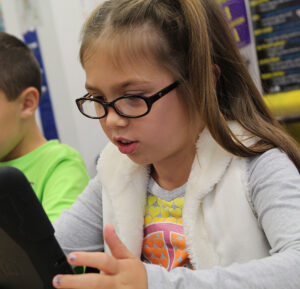 A Guide for Maine Families on Assistive Technology and Accessible Educational Materials (June 2020) [PDF]. A guide with the latest information on Assistive Technology (AT) and Accessible Educational Materials (AEM) for Maine families with children and youth with disabilities who are eligible for services and/or programs under the federal Individuals with Disabilities Education Act (IDEA). Published by Maine CITE.
A Guide for Maine Families on Assistive Technology and Accessible Educational Materials (June 2020) [PDF]. A guide with the latest information on Assistive Technology (AT) and Accessible Educational Materials (AEM) for Maine families with children and youth with disabilities who are eligible for services and/or programs under the federal Individuals with Disabilities Education Act (IDEA). Published by Maine CITE.
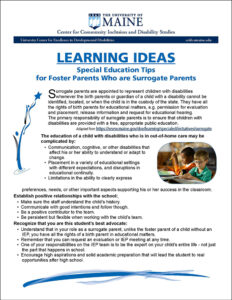 Learning Ideas Tipsheets covering a variety of topics related to Pre-K and school-aged children: Building Educational Support for Children and Youth in Foster Care; Special Education Tips for Foster Parents Who are Surrogate Parents; Understanding Accessible Educational Materials (AEM) and their Use: Tips for K-12 Educators; and Universal Design in Pre-K and Early Elementary Classrooms
Learning Ideas Tipsheets covering a variety of topics related to Pre-K and school-aged children: Building Educational Support for Children and Youth in Foster Care; Special Education Tips for Foster Parents Who are Surrogate Parents; Understanding Accessible Educational Materials (AEM) and their Use: Tips for K-12 Educators; and Universal Design in Pre-K and Early Elementary Classrooms
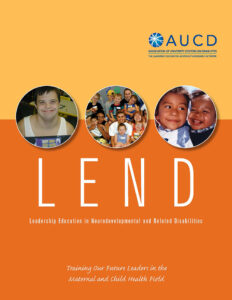 LEND – Leadership Education in Neurodevelopmental and Related Disabilities (PDF). LENDs provide long-term, graduate level interdisciplinary leadership, affecting public policy for children with developmental disabilities and their families.
LEND – Leadership Education in Neurodevelopmental and Related Disabilities (PDF). LENDs provide long-term, graduate level interdisciplinary leadership, affecting public policy for children with developmental disabilities and their families.
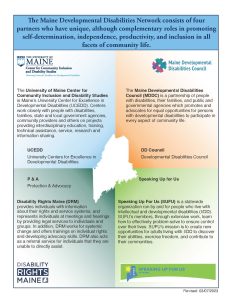 The Maine Developmental Disabilities Network (DD Network) [PDF] consists of four partners who have unique, although complementary roles in promoting self-determination, independence, productivity, and inclusion in all facets of community life. The four partners are University of Maine Center for Community Inclusion and Disability Studies (CCIDS), Maine Developmental Disabilities Council (MDDC), Disability Rights Maine (DRM) and Speaking Up For Us (SUFU).
The Maine Developmental Disabilities Network (DD Network) [PDF] consists of four partners who have unique, although complementary roles in promoting self-determination, independence, productivity, and inclusion in all facets of community life. The four partners are University of Maine Center for Community Inclusion and Disability Studies (CCIDS), Maine Developmental Disabilities Council (MDDC), Disability Rights Maine (DRM) and Speaking Up For Us (SUFU).
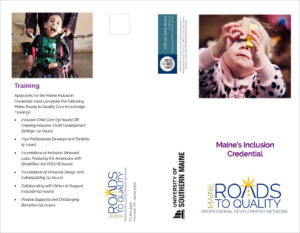 Maine Inclusion Credential – Maine Roads to Quality Professional Development Network, in partnership with the Maine Department of Health and Human Services Office of Child and Family Services, has developed the Maine Inclusion Credential to help practitioners build the skills, knowledge, resources, and attitudes to offer care to all children in an inclusive environment.
Maine Inclusion Credential – Maine Roads to Quality Professional Development Network, in partnership with the Maine Department of Health and Human Services Office of Child and Family Services, has developed the Maine Inclusion Credential to help practitioners build the skills, knowledge, resources, and attitudes to offer care to all children in an inclusive environment.
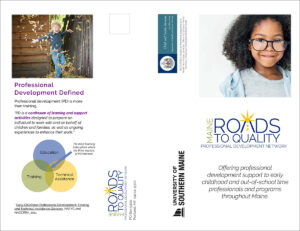 Maine Roads to Quality Professional Development Network (PDF) – Offering professional development support to early childhood and out-of-school time professionals and programs throughout Maine.
Maine Roads to Quality Professional Development Network (PDF) – Offering professional development support to early childhood and out-of-school time professionals and programs throughout Maine.
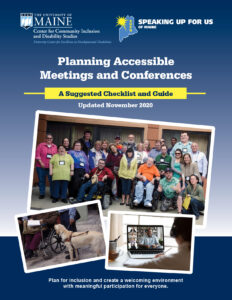 Planning Accessible Meetings and Conferences: A Suggested Checklist and Guide (PDF) is a free resource developed by the Center for Community Inclusion and Disability Studies in partnership with Speaking Up for Us, an organization run by and for adults who live with developmental disabilities. The checklist is designed to help any person, group, or organization plan a meeting or conference that is inclusive and welcoming. Its purpose is to provide practical suggestions that promote meaningful participation for everyone.
Planning Accessible Meetings and Conferences: A Suggested Checklist and Guide (PDF) is a free resource developed by the Center for Community Inclusion and Disability Studies in partnership with Speaking Up for Us, an organization run by and for adults who live with developmental disabilities. The checklist is designed to help any person, group, or organization plan a meeting or conference that is inclusive and welcoming. Its purpose is to provide practical suggestions that promote meaningful participation for everyone.
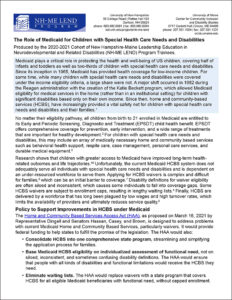 The Role of Medicaid for Children with Special Health Care Needs and Disabilities (April 2021). Policy brief by the 2020-2021 Cohort of New Hampshire-Maine Leadership Education in Neurodevelopmental and Related Disabilities (NH-ME LEND) Program Trainees. University of New Hampshire, Durham; and University of Maine, Orono.
The Role of Medicaid for Children with Special Health Care Needs and Disabilities (April 2021). Policy brief by the 2020-2021 Cohort of New Hampshire-Maine Leadership Education in Neurodevelopmental and Related Disabilities (NH-ME LEND) Program Trainees. University of New Hampshire, Durham; and University of Maine, Orono.
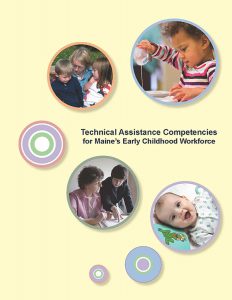 Technical Assistance Competencies for Maine’s Early Childhood Workforce (PDF) – A resource to support an integrated, cross-system and cross-sector professional development system whose ultimate goal is to provide high quality services to young children and their families. Developed with funding from an Early Head Start/Child Care Partnership Grant to Kennebec Valley Community Action Program.
Technical Assistance Competencies for Maine’s Early Childhood Workforce (PDF) – A resource to support an integrated, cross-system and cross-sector professional development system whose ultimate goal is to provide high quality services to young children and their families. Developed with funding from an Early Head Start/Child Care Partnership Grant to Kennebec Valley Community Action Program.
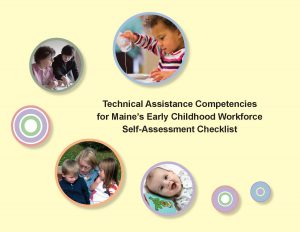 Technical Assistance Competencies for Maine’s Early Childhood Workforce Self-Assessment Checklist (PDF) – A companion document to Technical Assistance Competencies for Maine’s Early Childhood Workforce to assist TA professionals with assessing their skills within the five competency areas (professionalism, principles of adult learning, building relationships, the technical assistance process, and systems knowledge). The free Adobe Acrobat Reader DC is required to complete the checklist electronically. Please download How to Use the Fill & Sign Tool in Adobe Acrobat Reader DC (PDF) for step-by-step instructions.
Technical Assistance Competencies for Maine’s Early Childhood Workforce Self-Assessment Checklist (PDF) – A companion document to Technical Assistance Competencies for Maine’s Early Childhood Workforce to assist TA professionals with assessing their skills within the five competency areas (professionalism, principles of adult learning, building relationships, the technical assistance process, and systems knowledge). The free Adobe Acrobat Reader DC is required to complete the checklist electronically. Please download How to Use the Fill & Sign Tool in Adobe Acrobat Reader DC (PDF) for step-by-step instructions.
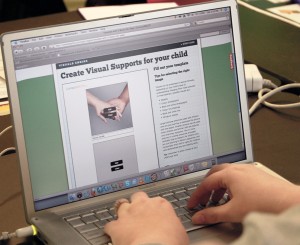 Visual Supports Learning Links and Templates – These resources are intended as a starting point to learn more about visual supports and to offer templates and suggestions to begin creating your own visual support materials.
Visual Supports Learning Links and Templates – These resources are intended as a starting point to learn more about visual supports and to offer templates and suggestions to begin creating your own visual support materials.
 The Warm Line (not a hotline!) is a free and confidential resource that provides NON-emergency person-to-person support for early childhood and school age professionals in Maine. The warm line is jointly staffed by inclusion, health, and mental health consultants from Maine Roads to Quality Professional Development Network and the University of Maine Center for Community Inclusion and Disability Studies. To contact the warm line, please email mrtq.warmline@maine.edu or call toll-free 1.844.209.5964.
The Warm Line (not a hotline!) is a free and confidential resource that provides NON-emergency person-to-person support for early childhood and school age professionals in Maine. The warm line is jointly staffed by inclusion, health, and mental health consultants from Maine Roads to Quality Professional Development Network and the University of Maine Center for Community Inclusion and Disability Studies. To contact the warm line, please email mrtq.warmline@maine.edu or call toll-free 1.844.209.5964.
